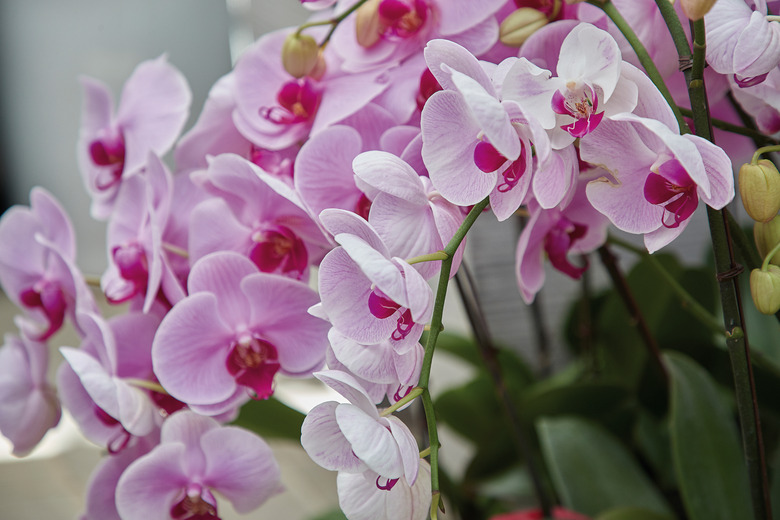My Orchid Flowers Are Wilting
We may receive a commission on purchases made from links.
Colorful, exotic and diverse, orchids (family Orchidaceae) have legions of dedicated fans. If your orchid flowers are wilting, revisit the care techniques you are using. With proper care, your orchid should not wilt unless its flowers are at the end of their life cycle. In this latter scenario, there's not much to be done.
Helping Orchids to Thrive
Helping Orchids to Thrive
The unique, sculptural beauty and many different varieties of orchids have a wide appeal, and, according to ProFlowers, there are more than 25,000 kinds of orchids that grow on every continent except Antarctica. They can be grown outdoors and indoors, depending on where you live. Hardier orchids can be grown outside year-round in parts of the southern and central United States, including coastal areas. U.S. Department of Agriculture plant hardiness zones 6 through 9 are best. Most types of orchids, however, will not survive in frost or in temperatures below 40 degrees Fahrenheit. Potted varieties can stay outside in warmer temperatures and can be brought inside when it gets too cold.
The majority of orchids do best in bright, indirect sunlight, but some prefer full sun. This information should be detailed on the plant's label. Orchids usually like east-facing and west-facing windowsills inside. Temperature-wise, their range is from 40 to 90 F, and humidity should be a minimum of 40 percent.
You should water orchids carefully. Before watering, lift up the pot to see if it feels heavy and only water when it seems light. You can also mist the leaves every few days with lukewarm water but do not spray the flowers, as this can leave water marks. Some varieties have different watering needs, so follow the label directions closely. Regular applications of orchid fertilizer will also help the plants thrive.
Why Are the Flowers Wilting?
Why Are the Flowers Wilting?
The most common reason your orchids might be wilting is that they are simply near the end of their life span. Some orchid flowers live up to three months, while others only stick around for two weeks or so. Also keep in mind that orchids go into resting periods while they store energy until they flower again, with the length of time depending on the variety. You can gently pull off wilted flowers, but allowing them to fall off by themselves will not harm the plant.
If the flowers are wilting and there are other symptoms, like black, moldy areas or white spots on leaves and/or in soil, then insect infestation or disease could be the culprit. To combat these, you may need to use an insecticide, bactericide/fungicide or other remedies.
There are less invasive methods to try as well. Mealybugs, scale insects and black mold can be wiped from leaves with a soapy sponge. Other homemade remedies include isopropyl alcohol and hydrogen peroxide, applied with a sponge or cotton swab.
Addressing Orchid Environment
Addressing Orchid Environment
The other reason for wilting flowers is the orchid's surrounding environment. Transferring them from cold to hot temperatures can shock them, and being near a heating vent is also detrimental to the blooms.
They also need consistent humidity and the proper amount of light, so you may need to place a small humidifier near your orchids or move them to a more amenable location. If the plant has been scorched by the sun, take care not to remove any damaged leaves until there are a few healthy ones growing.
